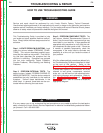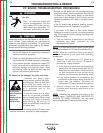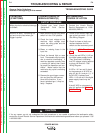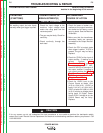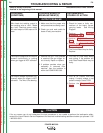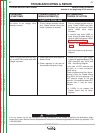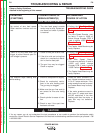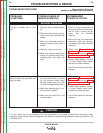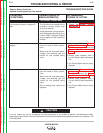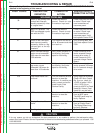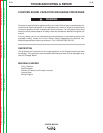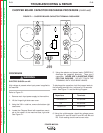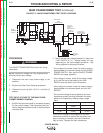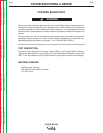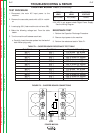
Return to Section TOC Return to Section TOC Return to Section TOC Return to Section TOC
Return to Master TOC Return to Master TOC Return to Master TOC Return to Master TOC
TROUBLESHOOTING & REPAIR
F-10 F-10
POWER MIG 300
If for any reason you do not understand the test procedures or are unable to perform the test/repairs safely,
contact the Lincoln Electric Service Department for electrical troubleshooting assistance before you proceed. Call
1-800-833-9353.
PROBLEMS
(SYMPTOMS)
POSSIBLE AREAS OF
MISADJUSTMENT(S)
RECOMMENDED
COURSE OF ACTION
WELDING PROBLEMS
The contact tip seizes in the gas dif-
fuser.
1. The tip being over heated due to
excessive current and/or high
duty cycle welding.
2. A light application of high temper-
ature anti-seize lubricant (such as
Lincoln E2607 Graphite Grease)
may be applied to the contact tip
threads.
1. Check the Output Voltage
Waveforms.
The welding arc is variable and
sluggish.
1. Check the welding cable connec-
tions for loose or faulty connec-
tions.
2. Make sure the wire feed speed,
voltage, and shielding gas are
correct for the process being
used.
1. Check the OCV and Output
Voltage Waverforms. If wave-
forms are not correct Perform the
Output Rectifier Assembly
Tests.
2. Reload latest software from a
Lincoln Electric sales representa-
tive
3. The Control Board may be faulty.
Replace.
CAUTION
The arc striking is poor. 1. Check the welding cable connec-
tions for loose or faulty connec-
tions.
2. Make sure the wire feed speed,
voltage, and shielding gas are
correct for the process being
used.
3. Run in settings may need to be
adjusted.
1. Check the Output Voltage
Waveforms. If waveforms are
not correct Perform the Output
Rectifier Assembly Tests.
2. Reload latest software from a
Lincoln Electric sales representa-
tive
3. The Control board may be faulty.
Replace.
Observe Safety Guidelines
detailed in the beginning of this manual.
TROUBLESHOOTING GUIDE



